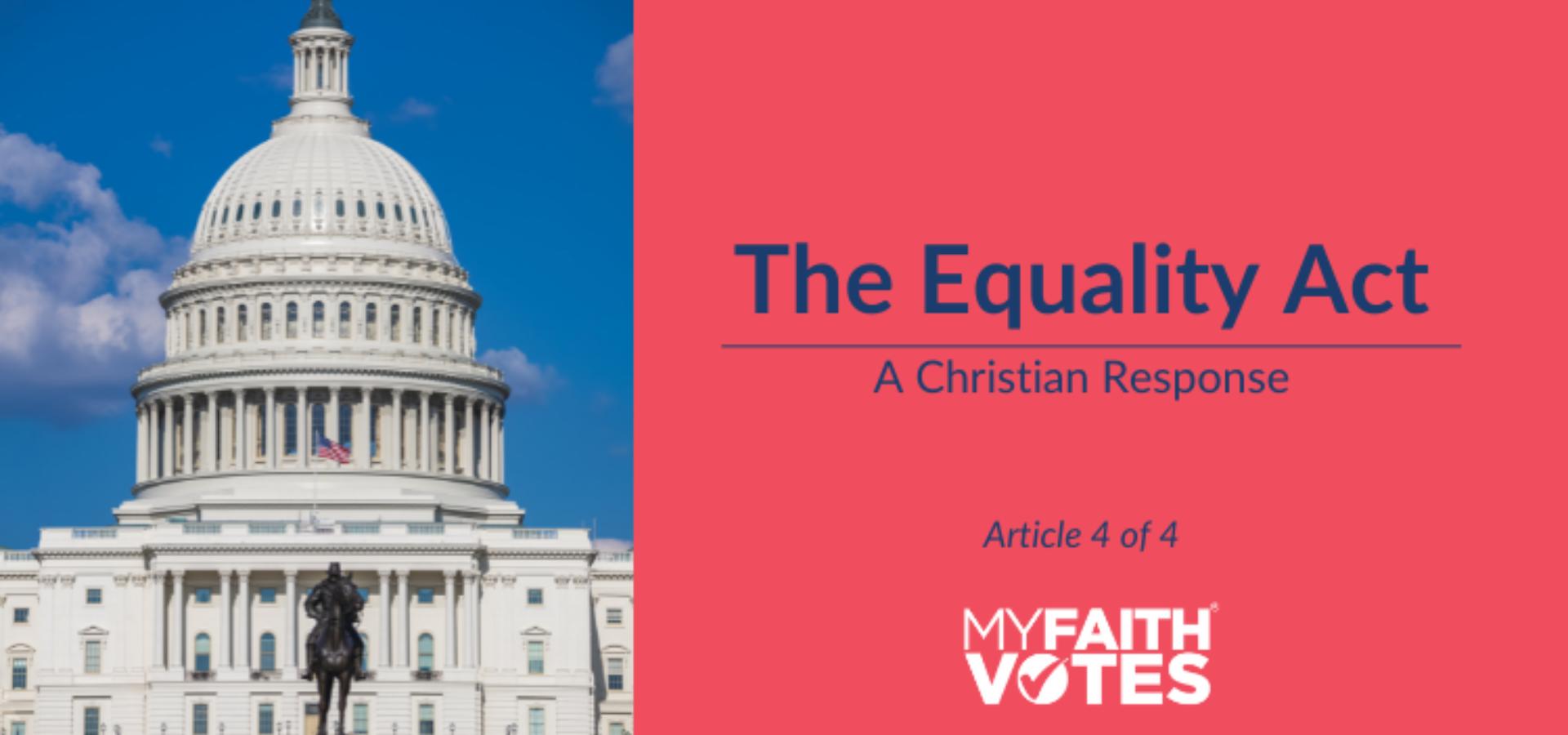
A Christian Response to the Equality Act
(This is the fourth in a series of four articles on the Equality Act)
The Equality Act has been called “the most invasive threat to religious liberty ever proposed in America.” It would amend the Civil Rights Acts of 1964 by forbidding discrimination on the basis of sexual orientation and gender identity.
In addition, this is crucial: the Act forbids appeal to the 1993 Religious Freedom Restoration Act (RFRA) on the part of individuals or organizations. Here’s what this means in practice:
- Faith-based hospitals and insurers could be forced to provide gender-transition therapies that violate their religious beliefs.
- Children could seek to change their gender without parental knowledge or consent.
- Faith-based adoption and foster care agencies could be forced to place children with same-sex couples or lose their licenses.
- The Act would dismantle sex-specific facilities, sports, and other spaces. As a result, biological females would be forced to compete in sports with biological males and for athletic scholarships. Sexual assaults on girls in bathrooms and showers could escalate.
- Faith-based schools and businesses could be forced to violate their beliefs regarding homosexual activity and LGBTQ behavior or face fines, censure, or worse.
- Churches that rent their facilities to the public could be forced to rent them for same-sex marriages and other LGBTQ events.
Explaining the Opposition to Biblical Morality
President Biden is a practicing Catholic. Many who support the Equality Act are also practicing Christians. Given the large evangelical population in our country, coupled with the number of Catholics who support biblical sexual morality, why would Congress and the Biden Administration support legislation that assaults the religious freedoms of millions of Americans?
In the minds of LGBTQ advocates, our opposition is considered homophobic prejudice. They view us in the same way we view racial bigots. In their minds, our appeal to religious freedom is as repugnant as if we were members of the KKK citing religious freedom as warrant for our horrific beliefs.
Extending this analogy, I’m sure you agree that racial discrimination is evil. Like you, I am convinced that racism should be repudiated and counteracted in every dimension of our society.
As a result, I would be deeply opposed if someone promoted racism by claiming biblical and religious warrant for their prejudice, demanded religious liberty protection for their beliefs, or built a massive media presence to promote their dangerous ideology. If they attempted “conversion therapy” aimed at changing the racial character of minorities, kept them from marrying people like themselves, or excluded them from adopting children, I would be similarly opposed.
Because I am convinced that racist ideologies and practices are dangerous to our nation and our future, I would support every legal response. For example, I would endorse school curriculum that taught racial inclusion and equality. I would limit racist exposure to the culture through social media and other platforms, ban racism in all governmental agencies and the military, and create pathways for racial minorities to marry and build families.
In short, I would characterize racists as social pariahs whose beliefs should no longer be tolerated by society.
Now, substitute LGBTQ equality for racial equality in the preceding four paragraphs. How we view racial bigotry is how many in our culture view our convictions regarding biblical sexual morality.
To this point, we are only seeing the first storm clouds of what I predict will become a hurricane of cultural rejection. For example, Facebook and Twitter have begun blocking posts critical of President Biden’s transgender policy. National Religious Broadcasters, an evangelical association of Christian communicators, has begun tracking examples of social media and other online platforms restricting Christian viewpoints.
If the Equality Act passes the Senate in its current form and is signed by the president, we can expect such opposition to our beliefs and liberties to escalate legally as well as culturally.
Five Ways Evangelicals Will Respond
I predict that evangelicals will respond to escalating cultural opposition such as the Equality Act in five ways, adapted from Richard Niebuhr’s classic Christ and Culture:
Christ of culture: Some will modify their beliefs in alignment with the shifting cultural tide. We are already watching pastors and theologians “change their minds” on biblical sexual morality. (See, for example, David P. Gushee in Changing Our Mind). This approach jettisons foundational biblical truth in a never-ending quest for cultural relevance.
Christ against culture: Some will demonize those who disagree with them and characterize the “other side” as the enemy. Others will withdraw from social engagement into communities where they can practice their faith without opposition. They will keep the “light” of the gospel under their “basket” while repelling those who might be attracted to it (Matthew 5:14–16).
Christ above culture: Some will adhere to biblical morality when in community with fellow Christians but make culturally required concessions in their secular lives and work. They may be able to avoid the consequences of their private beliefs, but their public compromises will hinder their witness and grieve their Lord.
Christ and culture in paradox: Some will engage secular society in order to defend religious liberty, working to secure a minority position for evangelicals in culture. This is a valuable and urgent mission, but we must do more than seek the “right to be wrong.”
Christ transforming culture: Some will speak biblical truth with courageous compassion. They will declare and defend biblical morality because they know that its truth is best for all people. They will view those who reject God’s word as those who most need God’s word. “Speaking the truth in love” will be their mantra and their mission (Ephesians 4:15). This is clearly the most biblical and effective way to respond to rising cultural opposition.
Three Practical Responses to This Perilous Threat
As I have stated often over the years, the Bible clearly forbids homosexual behavior. Now Christians who refuse to yield their biblical convictions regarding sexuality may face discrimination on an unprecedented level. Churches, schools, hospitals, ministries, and faith-based businesses could all be affected directly.
My purpose today is not to be an alarmist. It is possible that the Equality Act as it currently stands will never become law. It is possible that appeal to the RFRA could be restored. And it is very likely that if the Act as it stands becomes law, legal appeals will be numerous with adjudication eventually reaching the Supreme Court.
One: Be aware
Join the men of Issachar “who had understanding of the times, to know what Israel ought to do” (1 Chronicles 12:32). When Mordecai “tore his clothes and put on sackcloth and ashes” in response to a perilous threat against the Jewish people (Esther 4:1), Queen Esther sent a messenger to him “to learn what this was and why it was” (v. 5). Know what is happening and why, on this issue and others affecting our faith and culture.
Two: Take steps to engage
Write your senators or call their offices, urging them to vote against the Equality Act. (Consider adapting and using this form letter.)
Encourage those you influence to do the same. Pray for President Biden and others who support the Act to change their position on this historic threat to religious liberty in America. Oppose this Act by “speaking the truth in love” (Ephesians 4:15).
Three: Be hopeful
The Bible says of our Lord: “He changes times and seasons; he removes kings and sets up kings; he gives wisdom to the wise and knowledge to those who have understanding; he reveals deep and hidden things; he knows what is in the darkness, and the light dwells with him” (Daniel 2:21–22).
Nothing I have written today changes the character of our King. Our ultimate hope is always and only found in him (Psalm 20:7). And we know that our omnipotent Lord uses his people in ways we cannot measure to advance his eternal kingdom.
The hymn database Hymnary.org saw its page views double last year as the pandemic closed many church buildings. The most popular hymn on the database is “Holy, Holy, Holy! Lord God Almighty,” an 1826 song that proclaims:
Holy, holy, holy! Though the darkness hide thee,
though the eye of sinfulness thy glory may not see,
only thou art holy; there is none beside thee
perfect in pow’r, in love, and purity.
Let’s sing these triumphant words with our voices and witness, to the glory of God.
Thanks to Dr. Jim Dennison for contributing to this article.
###
My Faith Votes—is a nonpartisan movement that motivates, equips and activates Christians in America to vote in every election, transforming our communities and influencing our nation with biblical truth. By partnering with national faith leaders, My Faith Votes provides resources to help Christians Pray, Think, and Act to create an America where God is honored in the public square.
Website | www.myfaithvotes.org Twitter | @MyFaithVotes Facebook | My Faith Votes

 TV
TV